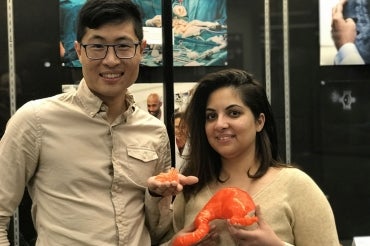Effect of AI on health care will be all-encompassing, U of T graduate students say in study

Published: March 6, 2019
University of Toronto graduate students have found that artificial intelligence, or AI, can be used to improve decision-making in almost every field of health care – a development that could profoundly improve the delivery of health services and sustainability of our health systems.
“This will be a quiet revolution to the way we practise medicine,” says Tim Rappon, an MD/PhD student in the department of medicine. “It’s not going to be, ‘Here’s your robot surgeon.’ But AI is maybe going to suggest a different approach to a particular surgery based on patient factors, pathology or genetics. AI will never replace doctors and nurses, but it is already streamlining and supporting their clinical practice.”
After an extensive literature review across databases in health, business and computer science, Rappon and PhD student Nida Shahid published their findings Feb. 20 in the peer-reviewed, open-access journal PLOS ONE.
Currently, much of the AI excitement in medicine is around prediction and classification of diseases. But the ability of intelligent machines to improve the health system has been overlooked and seems to be an important challenge for decision-makers, says Shahid, a student at U of T’s Dalla Lana School of Public Health.
Intelligent machines can help with everything from running a hospital more efficiently to deciding how to allocate resources and planning departmental workflows in a complex health system, says Shahid.
“I hope the increased use of machine learning in health care will help us make better decisions on all levels,” she says. “I appreciate we should be cautious in what AI-based tools have to offer and its potential limitations, however as decision-makers we’re also under a lot of pressure to make sure we are taking advantage of such advancements in our collective journey towards a value-based health system.
"I hope we truly leverage all it has to offer and engage in open and constructive dialogues across disciplines.”
The pair found that artificial intelligence is already being used to predict health care expenditures for Taiwan’s National Health Insurance program using macroeconomic, demographic and health system variables. Based on the results, the AI model produced significantly more accurate forecasts of health-care costs than classical forecasting methods. They also found that doctors are more likely to use hybrid versions of AI, to provide a more fulsome picture of the problem at hand.
“One model might say that a person has a 70 per cent chance of suffering from pneumonia. But a clinician needs to know why the machine thinks this way before starting treatment,” says Rappon. “A hybrid might spit out the 70 per cent prediction but also say this person is running a fever and that their labs and past history show they could have pneumonia.”
Much of the artificial intelligence that works to improve health delivery or the health system will probably be invisible to patients, the pair believe. Helping to make people’s medical records not just more accessible but also “intelligent” could be one crucially important development.
"What if the emergency room doctor who has never met you before could instantly see the most relevant parts of your past medical history for your presenting condition?” Rappon asks. “The first kind of use [of AI] will probably be better records, better use and sharing of records. There’s a lot of health data coming online now, but currently we’re not able to make good sense of it.”



